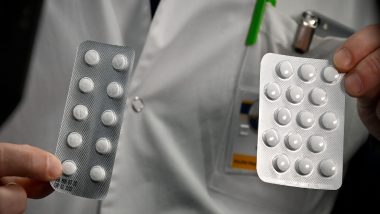Large, randomized controlled trials are considered as the gold standard for clinical trials. This, however, could not have been done for a pandemic as severe as COVID-19 which needed immediate attention. When the earlier findings suggested that the drug 'hydroxychloroquine' possessed antiviral properties against SARS-CoV-2 (the virus that causes COVID-19), hospitals worldwide began using the drug for treating patients with COVID-19 infection. India, being the biggest manufacturer of hydroxychloroquine, ironically has not been much vocal about its unrestricted use.
Though ultra-restricted with the usage of these drugs initially, India's medical research body ICMR has now issued a revised advisory on its usage. The new one recommends the use of hydroxychloroquine as a preventive medication for asymptomatic health workers on duty in non-COVID-19 hospitals, frontline staff for surveillance in containment zones and paramilitary/police personnel controlling and monitoring overall activities too.
The obscurity swirling around the effectiveness and usage-risks of hydroxychloroquine drug, the warnings by WHO against its use, then its endorsement by US President, followed by India exporting it to the US and 30 other countries including SAARC bring us to take an insight into what exactly it is, how does it work, does it have side-effects and how much is the world using it.
What exactly is hydroxychloroquine?
Hydroxychloroquine is a medication used in the treatment of malaria and certain inflammatory conditions. It is also widely used for the treatment of autoimmune diseases, such as lupus and rheumatoid arthritis. The antiviral effects of this drug were brought to the fore in the researches during and after the 2003 SARS-CoV-1 outbreak in China. Recent studies show that it has antiviral properties against the SARS-CoV-2 virus too.
*How is Hydroxychloroquine being found effective in treating COVID-19?*
The host cell has ACE-2 receptors on its surface which are prone to attachment with the virus. COVID-19 virus, on the other hand, has spike proteins on its outer surface through which it attaches to the cell. The hydroxychloroquine drug here interferes with the chemical environment and blocks the fusion of the virus with the host cell.
A Padma Shri Awardee, Dr Mohsin wali says Hydroxychloroquine is a zinc ionophore. It causes the ACE-2 receptors to reduce its binding capacity with the foreign virus. "The hydroxychloroquine drug increases the concentration of zinc in the cell thereby making it alkaline and preventing the virus from attaching to the cell and interfering with the RNAs inside", explains Dr Wali, Senior Consultant, RML hospital.
Does Hydroxychloroquine have side-effects?
Though the World Health Organisation, India's ICMR and few other entities have labelled warnings against the use of the drug, the guidelines for its usage are being relaxed seeing the surge in cases and efficacy of the drug in certain parts of the world.
According to ICMR's revised advisory, the drug is not recommended for prophylaxis in children under 15 years of age and pregnancy and lactation. Apart from this, the drug rarely causes cardiovascular side effects such as cardiomyopathy and rhythm (heart rate) disorders.
"The drug is safe for usage. The world is using it and getting good recovery results. I think India must get even more liberal for the use of hydroxychloroquine. There are no major side-effects. But we do need to be careful with those who have a weak cardiovascular system or are prone to heart rhythm complications. The course is decided by the doctors after having performed the required tests", says Dr Wali.
How much is the world using it?
The drug caught limelight when US President Donald Trump called it a "game-changer" in a tweet on 21st March 2020 also revealing about his consumption of the drug as a preventive measure against COVID-19. This was followed by news-pieces of studies and experiments regarding the medical response of HCQ drug from different parts of the world.
The drug was exported by India in large quantities in April 2020 and is duly being used for studies and treatments in the US, France, the UK, Brazil, Israel, Germany, Australia, the Gulf countries etc. ever since.
Reportedly, South America, Asia, Europe, Africa are already up with trials. testing people with HCQ drug. The drug is highly being used in the US by especially the frontline workers highly exposed to the risk of getting infected.
In Brazil, the guidelines for the usage of these anti-malarial drugs have been eased. France has allowed its doctors to begin the prescription, watching for the side-effects at the same time. The drug is also being used in Several middle-east countries where either they are using it for treatment or trials. Though India relaxed some restrictions for the use of hydroxychloroquine for COVID treatment in the new advisory, it may still go with keeping a low-profile on the drug.
(This article has been sourced from Prasar Bharati News Services as part of Coronavirus coverage)
(The above story first appeared on LatestLY on May 25, 2020 09:59 AM IST. For more news and updates on politics, world, sports, entertainment and lifestyle, log on to our website latestly.com).













 Quickly
Quickly





















